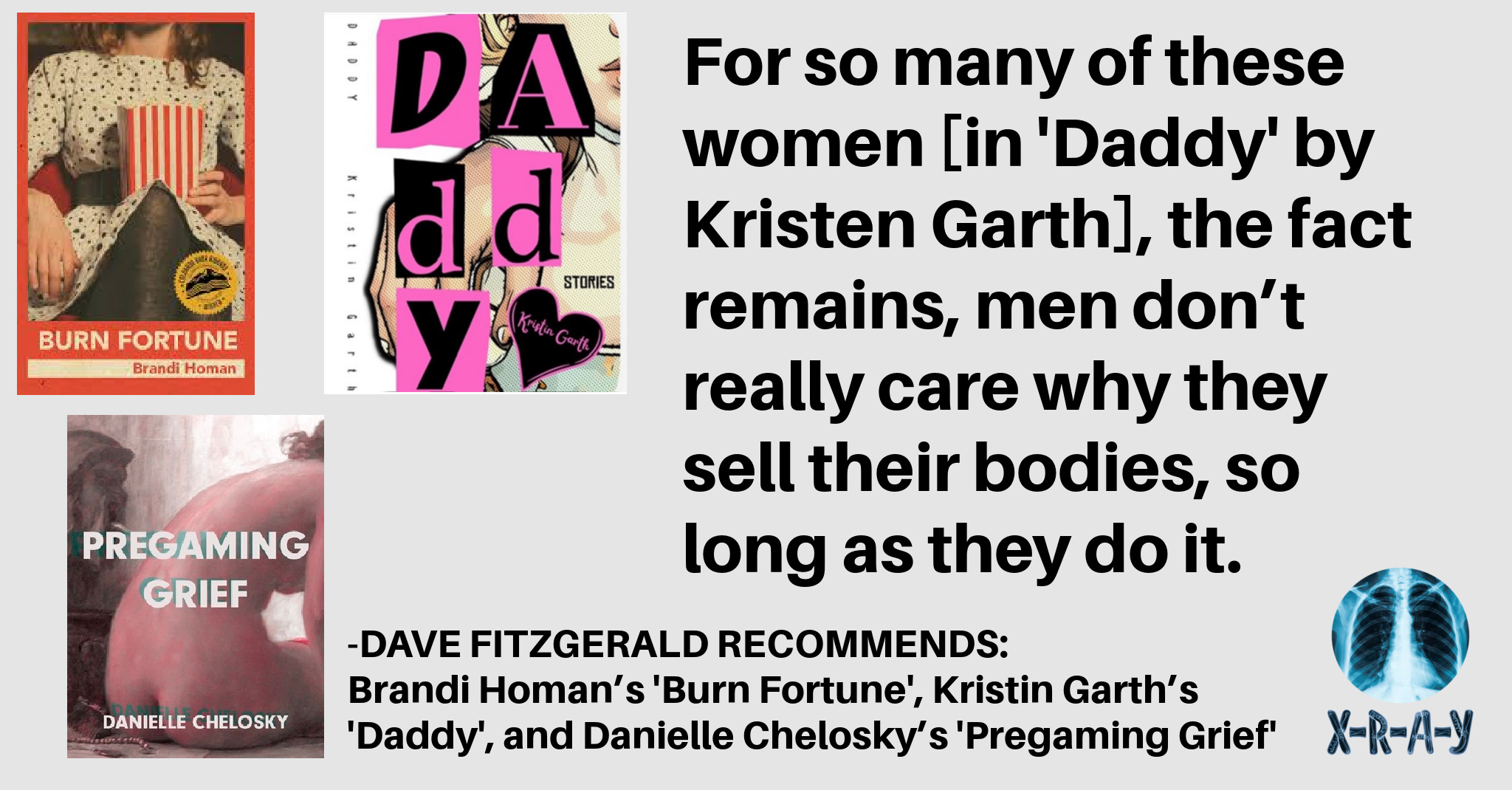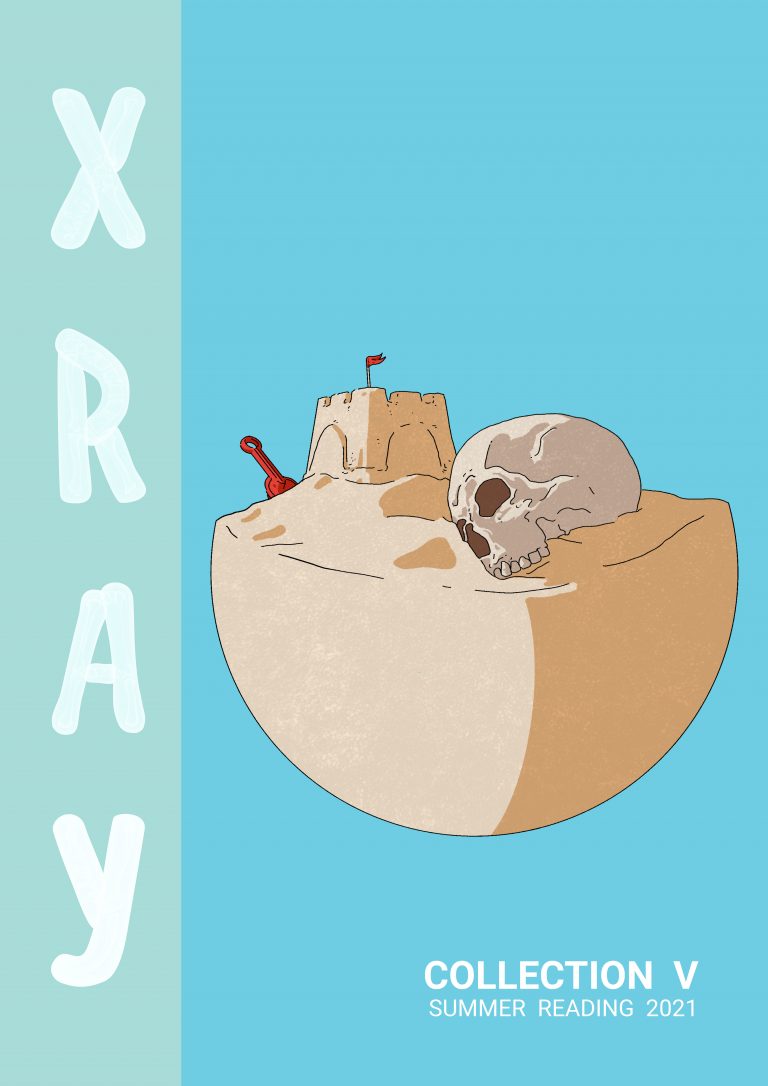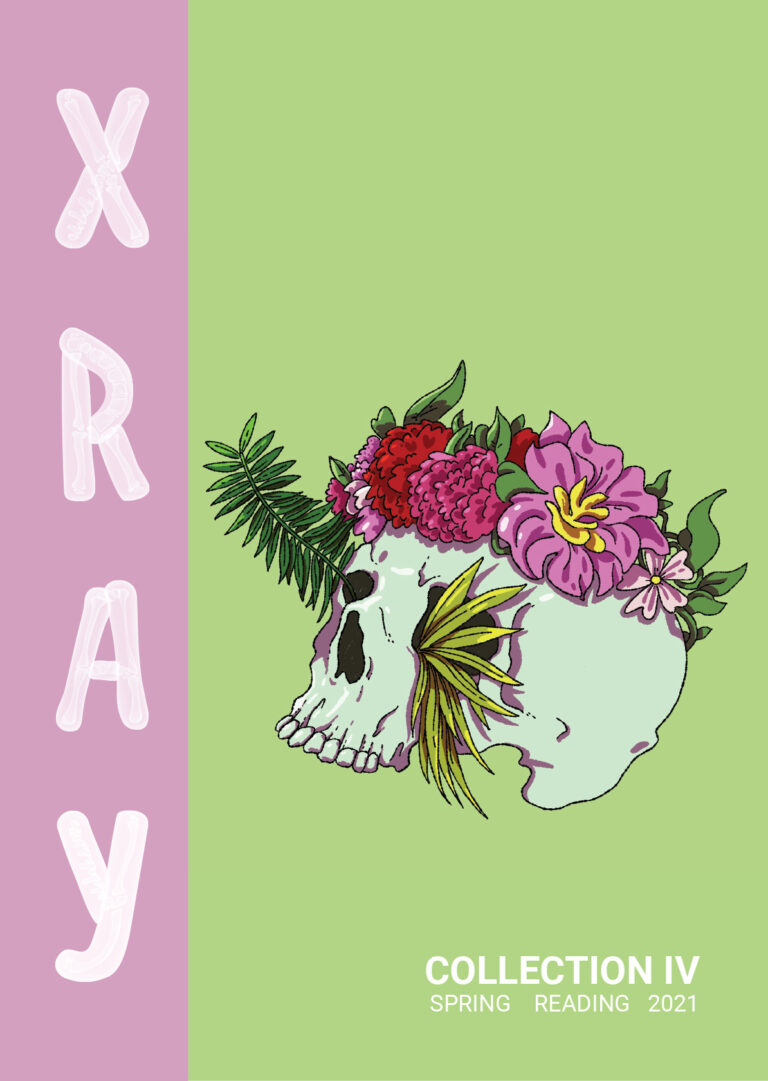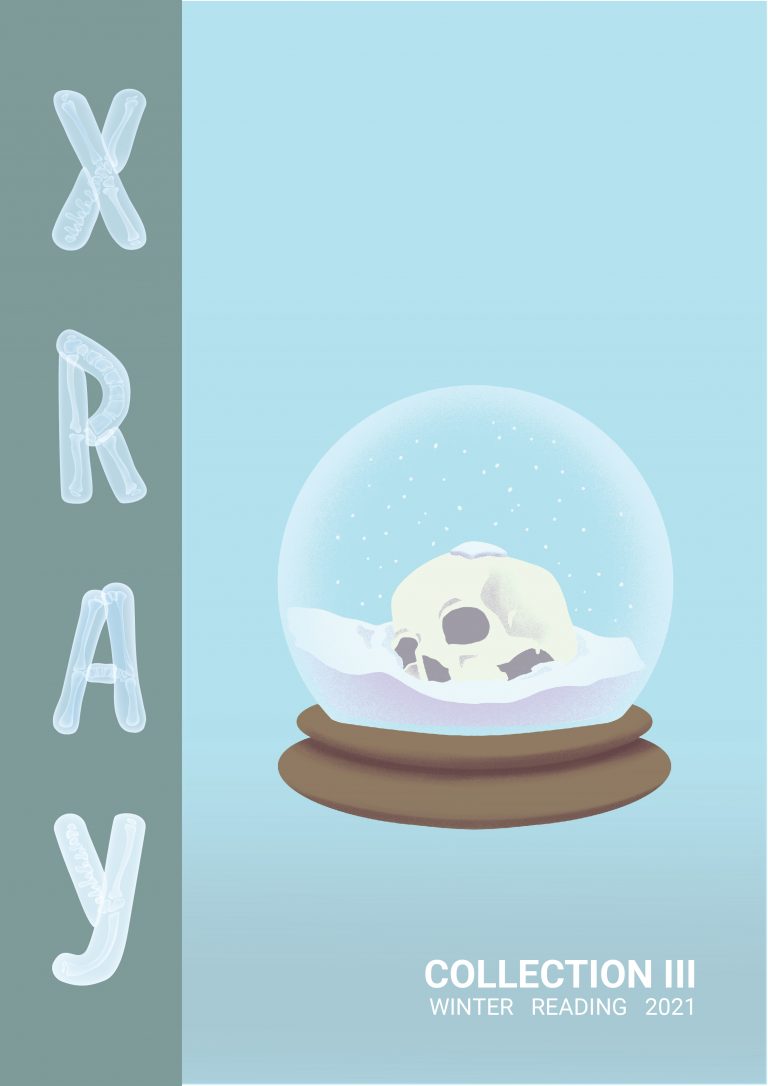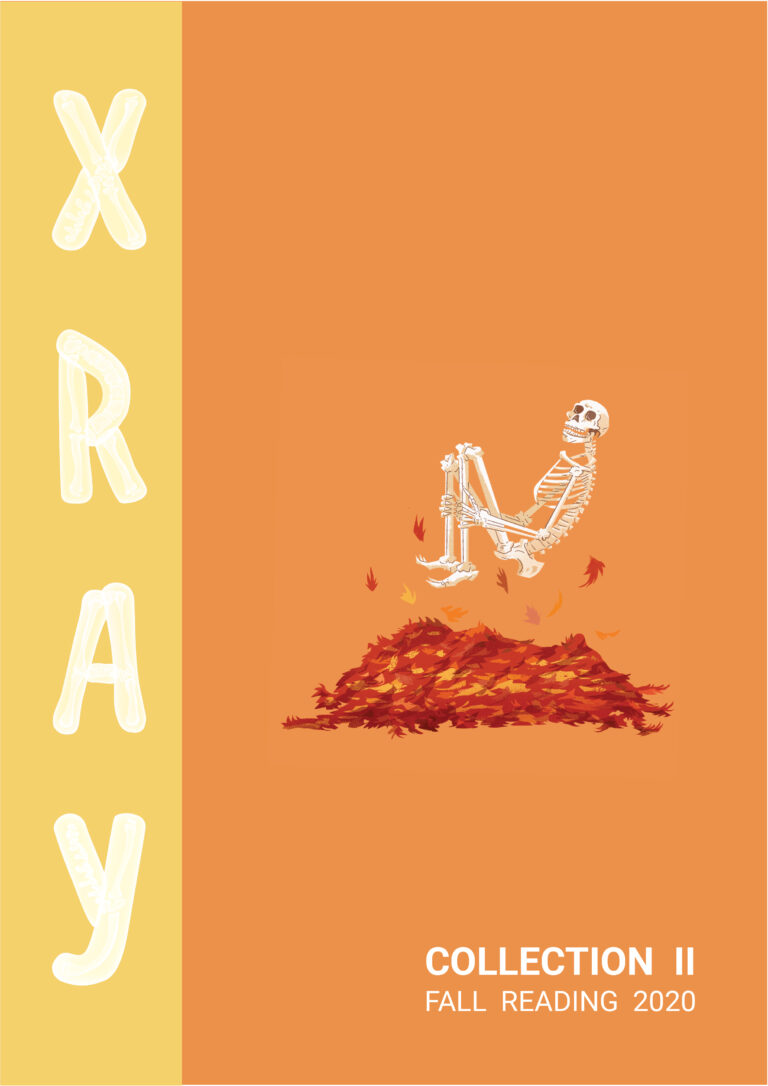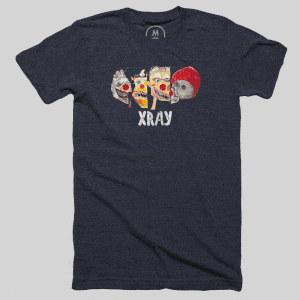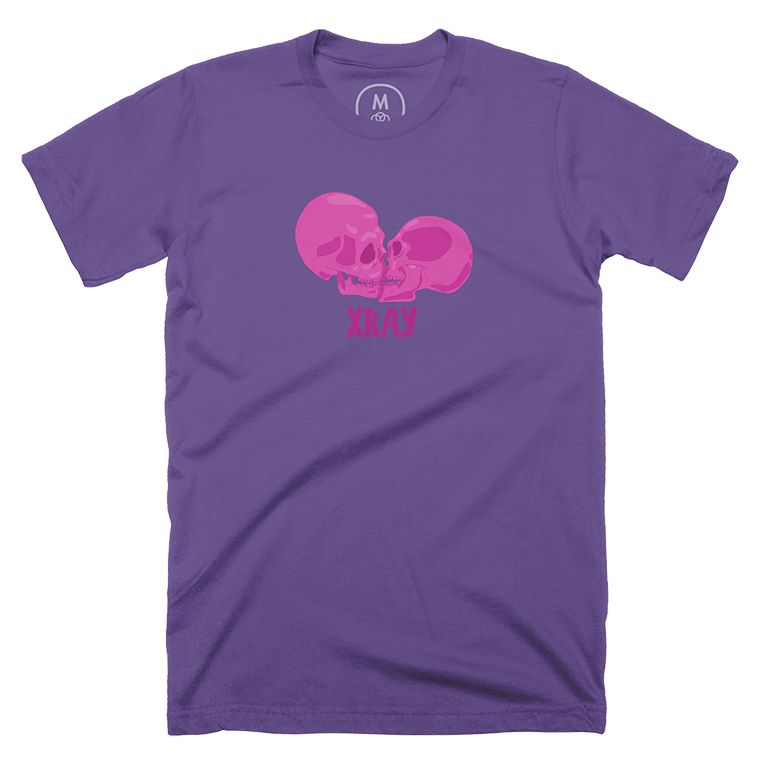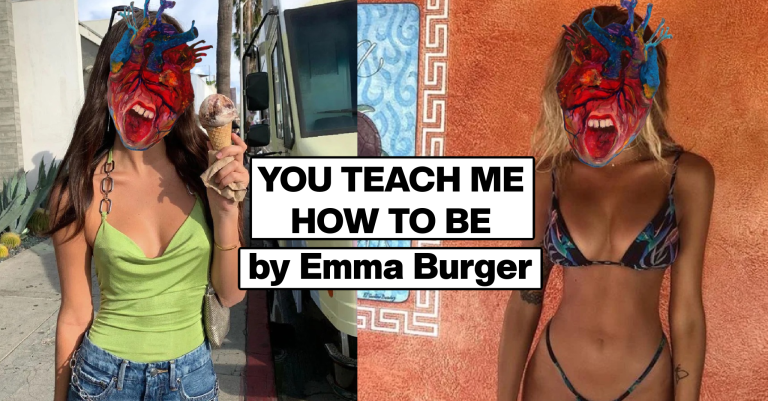
Fiction
YOU TEACH ME HOW TO BE by Emma Burger
You’re all so thin and beautiful. I only wanted to be like you. To want for nothing. To live in a gorgeous Tribeca loft. To wear Brunello Cucinelli and Loro Piana like it was nothing. To show up to morning drop-off at P.S. 234 with an expensive blowout and a full Alo set, en route to pilates. You lived the life I thought I deserved. One day. For now, I was supposed to be your yoga teacher. Your guide. I wanted my body to look like all of yours, but I was the reason yours looked the way they did. Well, it was partly me, and partly your private chefs, your nutritionists, your meal delivery services. Your microbiome mojo salad, your yoga bunny breakfast, your metabolism super powder smoothies. You filled my hospital room with flowers. Peonies and white roses. The designer kind that arrived in sturdy gift boxes. The types I’d seen in my Instagram feed to celebrate influencers’ birthdays in Dubai and anniversaries at the Ritz Carlton. I resisted the urge to peel off the EKG patches that dotted my chest. To roll the adhesive residue between my fingertips. Instead, I closed my eyes and listened to the rhythmic beeping, almost soothing in its sterility. I snapped a picture of the boxed white roses and posted it to my story, as if it were a Valentine’s Day gift from my husband and not a sympathy gift from my yoga students. The roses looked so crispy and white and clean in their black box. Their fragrance the antidote to the boxed mashed potatoes and stale urine smell of the hospital. Lying in my hospital bed, I imagine I’m here to deliver a baby. I imagine the roses are a push present, motivation to get me through hours of labor. I picture myself cradling a baby boy in my arms, just like you all have done. They look like you. I’d like to look like you too. Students. It’s strange to call you my students. If anything, I’m yours. You teach me how to be. I ignored the warnings, believing myself to be invincible. Believing the risks to be overblown. Heart attack. Stroke. Sure, okayyy. Maybe if you’re out of shape. Maybe if you’re old. I’m a goddamn yoga sculpt instructor. I’m 23 years old. If I have nothing else to offer, I have my youth. And you, my students, seem to love that about me. I have something you don’t. Had something, anyway, before this self-inflicted heart attack, which is what my doctors are now saying it was. Time. You wanted my youth. I wanted your everything else. I’ve been lying to my care team. I squirm in my bed as they try to discern why an otherwise healthy young woman might be stuck here, in this position. I could tell them I was abusing speed, but I’d rather see if they can figure it out. I first learned about speed on Reddit. It sounded too good to be true. These chronically online bodybuilder types didn’t care about the risks. They were motivated, like me, by the end result. By the optimization of our bodies to look exactly the way we want them to. They taught me to stack ephedrine with caffeine pills and aspirin. Warned me that I’d be carded at CVS for buying the ephedrine from behind the counter, but not stopped. Your bodies were my inspiration. You lived lives that made them possible. Easy, even. You resided in palatial apartments with elevator doors that opened right into your living rooms. I lived in a Chinatown two-bedroom with three other girls, all of us willing to do whatever it took not to go home to Long Island. Early mornings teaching yoga sculpt, late nights working bottle service at Marquee and TAO. I’m only making money when I’m awake, so I try to stay up and up and up. The speed helped with that. It felt too good to be true. This little cocktail allowed me to transcend my need for food. For sleep. I could make money around the clock. I could look like you. I buzzed with manic energy, ran laps up and down the West Side Highway. Vowed never to sit down when I could be moving. Taught more yoga sculpt classes, subbing whenever I could. Picked up more shifts at TAO. Brought home more in tips with my new body. My energy was infectious, one guest told me beneath burning sparklers.My heart pounded as I moved through sun salutations, but I paid it no mind. My chest pounded as I handed out flutes of Dom from the tray balanced precariously on my shoulder. My body shrunk. The packed club felt easy to glide through when I was high. It felt like I could fly over the crowds, straight to VIP. I’m too embarrassed to admit what I’ve done to myself. To be like you. To look like you. I thought I’d found a cheat code. Who cares that it made my thoughts race. Everything race. There aren’t enough hours in the day to do anything else but move fast. I look at the box of flowers you bought me and cringe, filled with shame. I’m not telling anyone what I’ve done. And when I’m all better, I’ll go back to class and teach you how to keep those bodies you already have. Those bodies I so badly want to inhabit.
September 15, 2025
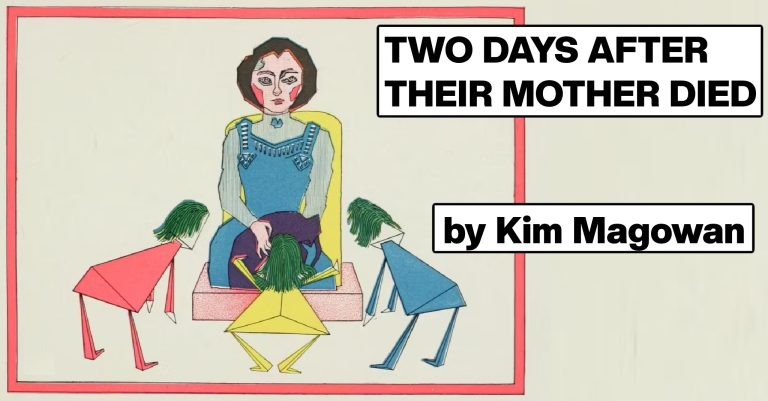
Fiction
TWO DAYS AFTER THEIR MOTHER DIES by Kim Magowan
Josie uses her key to let herself and her sister Amy into Cora’s apartment. She walks in first, then turns to see Amy standing in the doorway, hand braced against the doorframe. Josie says, impatiently, “Come on.” Finally, Amy enters this apartment their mother lived in for three years, moving here after she injured her knee and at last accepted that it made no sense for an older woman to be living in a house with two sets of stairs. But Amy has never seen it, because she’s so stubborn and unforgiving. Watching her older sister walk slowly into the apartment reminds Josie, painfully, of their mother. After she got sick Cora slowed down too, as if just moving her body hurt.Josie opens the window over the kitchen sink. It’s stuffy, the air stale. The apartment has that unlived-in feeling of coming home after a trip. Cora had been in the hospital for twelve days prior to dying, during which Josie came here only once, to pick up her alpaca shawl and pairs of cozy socks. But it’s very neat. There are three plates and a coffee mug drying in the dish rack. Cora never used her dishwasher—“What’s the point?” she’d say. “It’s just me.”. Now Josie puts the plates and the coffee mug in the cabinet. It’s not a big apartment, all one long floor with the bathroom and the bedroom in the back. Nonetheless it’s pretty. Their mother has great taste.Had. Watching Amy look around, Josie wonders what Amy will want, will claim. The painting over the decorative fireplace is quite valuable, for instance. Amy must remember that painting; their mother bought it years ago. It was inspired by a photograph of a girl sitting in a cornfield with her legs bent behind her. The girl in the photograph was crippled, couldn’t walk, though you can’t tell that from the photograph, or from the painting. At any rate, it’s worth money. There are other things in the apartment worth money. Josie wonders whether Amy is assessing these items—the artwork, the knickknacks on the end table, a ceramic pear, a Murano blown-glass vase—and calculating their value. She studies Amy, in her cowl-neck cashmere sweater. Amy, like Cora, values material objects. Earth signs, both of them. Josie feels her lips tighten and thin into a grimace. Amy pauses by the framed photograph of the three of them on the end table, taken that day they went to Point Reyes and ate three dozen oysters—so many oysters! It’s the one photograph of Amy in the living room, though Josie knows there’s another one by Cora’s bedside table, taken after Amy’s graduation from Smith. The living room photo flatters Amy more than Josie, who is squinting. They used to argue about photos. “Delete that one! I have a double chin!” Watching Amy, Josie hopes she feels bad. The heat of the feeling surprises her, since just yesterday she was telling her friend Bridget “My relationship with Mom was good—well, Mom was complicated, but mostly good. I’m worried that Amy will take her passing much harder than me, because they were estranged.” But now, she wants Amy to feel shitty. To confront her rigidity and selfishness. To brim with impossible regrets.How hard could it have been to visit Cora in the hospital? To make peace? Every time Josie visited her, she saw her mother turn to the door, see her, and a flash of disappointment would slip over her face. Because of course Cora would have hoped that the silver lining of dying is that Amy would want to see her. “Mom is dying.” Josie told Amy that, two weeks ago. The only time Amy had come up in conversation was towards the end, when Josie was holding her mother’s bony hand and Cora looked into her eyes and said, “Tell her—” She never completed the sentence, and after waiting a minute, Josie said, “I will, Mom.” And she will. Someday. At some point Amy might ask, “Did Mom give you any message for me?” and Josie will tell her, because Josie knows perfectly well what Cora meant to say, even if she never in fact said “Amy” or completed her own thought. But Amy will have to ask! She will have to fucking ask.Josie watches Amy pause in front of the loveseat and coffee table—that’s where their mother used to sit and watch TV, her Brit Box detective shows, and do her needlepoint. Her sewing basket is on the coffee table, as always. Amy bends, fishes inside of it, and grabs Cora’s embroidery scissors. She always bought the same kind of scissors, tiny ones shaped like a stork, the upturned beak the blades. The loops you stuck your fingers through were the legs. “I want these,” Amy says, looking at Josie. How they loved those scissors when they were little girls! They always wanted to play with them, to cut out their paper dolls and snowflakes. “They are not a toy,” Cora would say, sternly. Also: “Be careful!” Though Josie understands that she probably meant be careful not to cut yourself, not what she’d assumed then—be careful not to damage my scissors. The sisters regard each other. The scissors are lovely, but not valuable. They probably cost less than forty dollars. Amy isn’t asking permission, Josie thinks. She isn’t saying “May I have these?” She gives permission anyway, as if the scissors are hers to dispense. “Take them,” says Josie, putting peculiar emphasis on the verb.
September 10, 2025
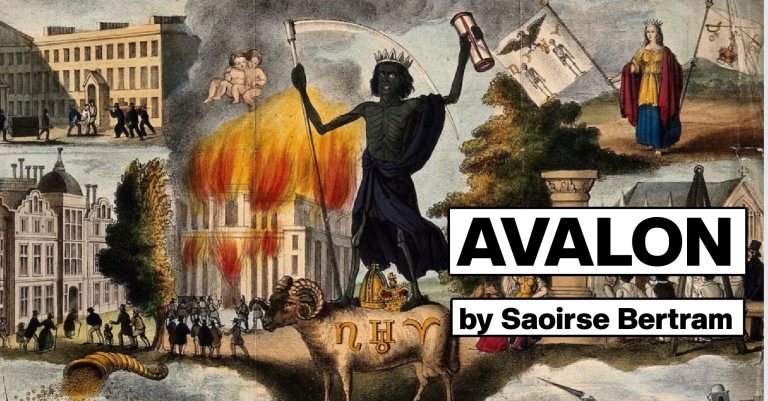
Fiction
AVALON by Saoirse Bertram
On the Fourth of July the grandmother took Vase to the top of the warehouse where a rickety carriage of iron stairs led to the roof. The sky was as orange as a snake’s belly and smelled of powder and dust and oil. They sat without speaking watching the brilliant detonations which Vase had never seen before just as she had never seen the full horizon of sky over Los Angeles and when the grandmother felt tired Vase was sorry to have to leave the sight so soon. Vase had only been with the grandmother for a couple months at that point. The grandmother had taught her how to garden and read and she was now learning new words from the library of old paperbacks printed on groundwood paper that were stacked in piles over much of the warehouse. While Vase did this the grandmother worked in her private quarters on humming machines doing business for the municipal government. Then in the evening the grandmother would cook herself a stew using the root vegetables Vase had harvested and sit sipping at her table while Vase stewed in the black bath that bubbled in a metal basin which had been built into the center of the kitchen. Then the grandmother would say good night and leave Vase there in the dark until morning.There were no guests. The grandmother made short calls and sent messages through her computer about her work and men in black vans would once in a while knock on the heavy front door to drop off boxes of essential equipment and supplies. When this happened the grandmother would tell Vase to keep to the agriculture room or one of the other out of sight parts of the warehouse before unbolting the latches but the men never stayed anyway. By fall the grandmother began to let Vase ask her lots of questions because neither of them had anyone else to really talk to. She tried to answer in as many words as possible so Vase would learn how to be a conversationalist although she kept professional and revealed as few truths as she could.That winter the grandmother received an especially long phone call and told Vase that she had to leave for the night or possibly two to deal with some pressing matters for the mayor. She packed a briefcase with folders and hard drives and set the black bath to boil and left Vase in the dark locking the door to the warehouse behind her from the outside. The car that arrived for her took her north to City Hall on a circuitous route that was without incident but when the driver started it again in the morning to return the grandmother to her warehouse they were both instantly killed by the detonation of an explosive device that someone had wired to the ignition switch.Vase stayed in the black bath for a long time. Her hair and skin became black and her teeth became black and her eyes became black too. The mayor tried sending some of her staff to the warehouse to retrieve what the grandmother had been working on there but the city broke into real disarray and none of them made it. The lights had been left on in the agriculture room and the vegetable garden overgrew and vines and bunches of foliage took root in the decomposing books and doves and chickens made their way in through one of the windows after it was knocked out by debris from one of the neighboring buildings which had only been reinforced for earthquakes. The sky was red and black then but Vase did not see this.After the bombings stopped boys began to make their way through Los Angeles in search of sustenance and items of value to sell secondhand. One of them entered the grandmother’s warehouse with a crowbar through the door in the roof and was surprised when he found a bubbling vat of what looked like oil with an oil-colored girl asleep in the middle of it. He thought she was very beautiful and took a photograph with his phone and when she remained unresponsive to his camera flash he touched her to see if she would wake. Her skin made his hands itch and smell like copper and he tasted copper in his mouth too. When Vase stood up they were both startled. Vase tried to talk to him after waiting in the dark for a while but by then he was the one who did not move no matter what words she spoke to him. She heard the door swinging upstairs and went to the roof and watched the sun set in the green sky over the far-off encampments of Santa Monica.By that next Fourth of July the rains had really picked up and so had life in the city. Inside the squash and tomatoes rotted into stinking beds of seed. The birds which had survived began to move out of the warehouse and traffic could be heard again on some of the streets in the distance. No one wanted to set off fireworks anymore but the air was so thick that people could use colored spotlights to create patterns in the raindrops and chalk particles in the sky. Vase sat silently on the roof and watched a blue and magenta spiral burn through the atmosphere above City Hall and saw shapes like silver serpents move eastward over the Hollywood Hills and into the long desert where Las Vegas had been. She did not understand that the grandmother would never come back home.The rain covered her completely. Her skin became translucent and she felt warm and cold at the same time. She wondered what the word was to describe this feeling but when she asked the last of the doves it answered with a cruel platitude that had nothing to do with her question at all and soon she was all alone again.
September 9, 2025
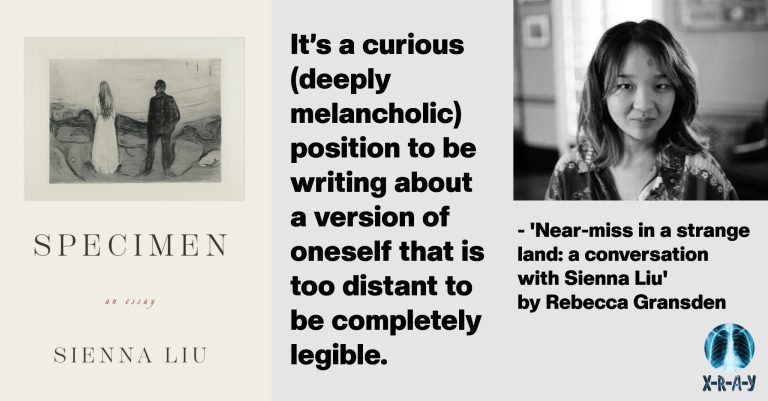
Interviews & Reviews
NEAR-MISS IN A STRANGE LAND: A CONVERSATION WITH SIENNA LIU by Rebecca Gransden
Sienna Liu’s Specimen (Split/Lip Press, 2025) seeks to articulate the ineffable facets of desire. A fragmentary and lyrical hindsight finds lovers in an entanglement as fragile as it is seemingly unwise. Not only an interrogation of memoir, of the compulsion to write other people onto the page, but a probing commentary on the price and rewards of setting out on such a task. When we look back, what do we ask of those who reach out in memory? I spoke to the author about this plaintive and dissecting book. Rebecca Gransden: When did you set out upon writing Specimen? What length of time had elapsed between when the events of the book took place and putting them down on the page?Sienna Liu: I started writing Specimen in February 2023, about ten years after the events in the book took place.RG: I met someone at a party; something about him reminded me of E. I hadn’t thought about E. for a very long time. Too long, so that when I saw this faint replica, it felt as if a complete stranger had caught up with me on a street and started to tell me a secret about myself. We see echoes of others in people. Were there echoes that brought about your decision to write the book? What made you decide to write about this time and these events?SL: Exactly! It happened just like I described—I was at a party one day in February 2023, and met someone there who reminded me of E., a lot. I do tend to find echoes of others in people, but up till then I had not really encountered a true doppelgänger of E., who I had for the longest time thought to be one of a kind. I’ve also thought about writing about E. so many times but was never able to start. But finally meeting someone who was that reminiscent of E. felt like a writing prompt: now, go write. I left that party and started writing the first vignette as soon as I got home.RG: How did you decide upon the title for the book?SL: I can’t remember the precise moment, but at some point I realized I used / would use the word specimen in the book a few times, in different contexts with different meanings (“a specimen of human folly” / butterfly specimens). It seemed to be a great title for this project because a specimen is a thing that is artificially frozen in time (a recollection), and a singularity that also generalizes (which calls for an examination).RG: A theme in the book that stands out to me is that of the gulf between what we project and what is understood, what we transmit and receive, the gaps we leave, both consciously and unconsciously. Are there gaps to be found in what you intended for the book and how it turned out?SL: That’s such an acute observation, and an interesting question! Rather than gaps, to me the writing of the book shows how much perspectives can shift (i.e. how we can learn to acquire different eyes, how we can pick up a loving gaze). I had wanted the book to be on the colder side, and thought that was how it was executed, until very recently I realized how heartfelt it actually is. One of my best friends noticed that too: he read an early draft of this manuscript and told me it hurts because of its sharpness. Two years later, he read it again and told me this time it hurts because of its tenderness. I did not think I intended that tenderness, but it somehow came out in the writing.RG: How do you invoke a sense of place. To what extent does place feed into the direction of the book?SL: Places in this book are the center stage for disappearances (or absences). (“I was never there. Because he was never there. That city was forever defined by his absence.”) The book was organized into four parts, and each part, originally, had a title that was the name of a city. The whole thing was supposed to feel like a chase—a futile pursuit. A chase around the globe for a person or a phantom that was forever unattainable. She looked around and noticed things only because he wasn’t there. He wasn’t there—and that enabled her to live, only she didn’t know it at the time.RG: I often thought about the fact that he introduced himself to me in symbols (the Tarot cards, the music he chose to play, the Yuxi (玉 溪) he smoked, the Bombay Sapphire he drank, as if it could only be this way). Literary and mythological vignettes. Symbols, fragments. Digestible bite-sized illusions. He recognized this too. Later on he said, “I was too broken when I first met you.” The book’s relationship to symbols is multifaceted, at once divining and obscuring, especially in relation to the attempt at knowing another person. What was your approach to the symbolic for Specimen?SL: It’s interesting—when you say “the symbolic” I think of the Symbolic of Jacques Lacan, the order of language and laws. According to Lacan, the symbolic is made possible because of our acceptance of the Name-of-the-Father, those laws that control both our desires and the rules of communication. In other words, the symbolic is both enabling and limiting. In Specimen, too, though it’s not quite the same thing, the symbols that float about both enable interpretation and limit imagination—they usurp the image of the other person, but their existence also enables the desire in the first place.RG: A dominant theme of the book is that of time. Specimen explores the limits of looking back on events from a distance, and poses questions on what stays with us, what part of the act of recollection can be trusted. At the conceptual stage, did this theme impact your decision on how to approach form and style for the book?SL: Definitely—it’s a curious (deeply melancholic) position to be writing about a version of oneself that is too distant to be completely legible. In an earlier draft of the book I discussed this dilemma more expressly: There’s nothing more alienating than standing face to face with your former self. That absolute distance—any exchange is doomed to be one-way. That’s why the “I” I’m using now is entirely fictional, and reading this lifeless record is the same thing as mourning, because those two people who had been talking to each other incessantly—and their incessant oscillations and fears and little defeats in life—no longer exist. RG: How do you view Specimen’s relationship to both memoir and fiction? Do you draw a firm line between reportage and narrative, or do boundaries blur? What is your approach to the tensions between these elements?SL: I’m glad you asked this question, because for a while I wasn’t sure whether Specimen was a novella or a short memoir. I didn’t quite decide which one until very late in the process, but to me that distinction didn’t matter as much. It had always been my goal to only speak my personal truth, to do my best to reconstruct and interrogate that part of my history, and to do all of that with full sincerity. In the end I chose to call it non-fiction, but it could very well have been labelled a novella. RG: Do you keep a journal, use notebooks? If so, has this practice impacted Specimen?SL: I kept a handwritten journal at various points in my life, but never did it consistently—and I lost most of those hand-written records after moving countries several times in the past decade. I do keep a lot of notes on my iPhone and still have them to this day. When I was writing Specimen, I mostly looked through those digital notes and text messages and chats on other instant messaging platforms, which helped me reconstruct the timeline and more importantly, what I was feeling back then. In that sense Specimen is a book by and for the first generation, I think, who recorded their youth through digital means.RG: I thought about this thing I once read somewhere: a writer is trying to write about an amorous affair in her youth. She could only do it in fragments and vignettes because she perceives no continuity in that passion. She writes down scenes, dialogues, traces of a memory, on index cards. She puts those cards into drawers, into various books as bookmarks. Years later, after moving and rearranging things and getting rid of things, she realizes all the cards have disappeared or disintegrated. What’s more, she no longer retains one single line from that great passion. What place does passion have in the book?SL: It very much is the book! I think I was only able to write it because of how blazing, gazing it all felt—how violent, almost, as it occurred, that obscured a lot of other things. I once had a conversation with Marie Darrieussecq about passion and love, and she said, “Love is common, trivial, ‘small’, not huge nor scary, love is on a day to day basis, love is regular when passion is intense and deadly. Love helps you to live, passion prevents you from living.” And I could not have put it better. Passion prevents you from living, but it often enables your writing.RG: Several dreams are recounted in the book. Do you dream about Specimen? SL: Dreams mean a lot to me. I tend to have vivid but mythical dreams that have no basis in reality (or so it seems to me). I do keep a log of them that I call my “dream log”—might become a book one day. I don’t dream about Specimen in any literal sense, but the book lives in a kind of dreamscape for me. Writing it felt like navigating a landscape where memory, desire, and uncertainty blur together—much like a dream. RG: I was never there. For instance, I would be making dinner with Nathalie, and she would ask me about my day. “Pas mal,” I said. There was nothing more I could add. In my philosophy class, I could faithfully transcribe everything on time and eternity and the essence of things, but back into the small kitchen in the fifteenth arrondissement, back to the day-to-day, I couldn’t speak a word about how I really felt about anything. A sense of melancholy detachment hangs over the book. Do you consider Specimen as capturing a particularly modern malaise?SL: Yes, I think so, not in the sense of diagnosing a generation, but in inhabiting a kind of quiet, persistent dislocation. It’s the feeling of being “at once myself and not myself.” The body is present, the gestures habitual, but the self is elsewhere, numbed or abstracted by the unsayable. We live in a time where we are inundated with language—surplus language, even—and yet the ability to translate ourselves to others often slips away from us. In a way the melancholy isn’t personal or generational; it’s structural—baked into how we live, how we love, how we try and often fail to connect.RG: A few weeks later I saw a painting at the Fondation Louis Vuitton, a painting by Edvard Munch called “Two Human Beings: The Lonely Ones.” A man and a woman had their back to us. The woman had long blonde hair. She wore a luminous white dress. The man was in a dark suit, a step behind the woman, with one of his legs stretching towards her, as if he were hesitating whether he should take that step. Something about this image of frozen uncertainty made me think of E., and about what is ever possible between two human beings, especially the lonely ones. I thought about us sitting on the floor of his room facing a big loaf of country bread as hard as rock, imitating the silence of the gods, and how I had felt that finally, I was beginning to know him. Another few years later, I saw this exhibition again in New York. This time I just felt sad. Edvard Munch’s Two Human Beings. The Lonely Ones (1894) features on the cover, and is mentioned in the book itself. How did you decide to use this as the cover image?SL: When I first saw that Munch painting in Paris (around the time when E. first broke my heart), I was struck by the space between the figures: it was not dramatic, not hostile, just… irresolvable. They’re close enough to touch, and yet they don’t. That distance—tender, painful, suspended—was exactly how it had felt with E. and how it had felt, writing Specimen. The painting suggests a kind of companionship shaped by silence, by what is withheld rather than expressed. It also evokes the strangeness of time: how people can drift through years beside each other and still remain, in some essential way, unknown. The image holds a tension I wanted the reader to feel before reading a single word.RG: Specimen is littered with references to literature, the use of excerpts, mention of works of art. What writers or artists, if any, do you consider as an influence? Are there works with an affinity to Specimen?SL: Around the time I was writing Specimen I was obsessed with Annie Ernaux (aren’t we all), so I definitely see the influences of, say, Simple Passion, or, A Girl’s Story. I thought about Natalia Ginzburg’s work a lot too. And I have completely forgotten about it until now, but around the time I finished Specimen, a friend of mine recommended Maggie Nelson’s Bluets to me, and I had said to him, this really reminds me of something I’ve been working on! RG: I found Specimen to be a form of spiritual and psychological archaeology, searching for applied meaning in fragments. Do you continue to analyse the book in retrospect? SL: That’s a beautiful question, and it touches on something essential about how Specimen was written. I did interpret the material closely as I was writing. The process was reflective, even analytical at times, but once the book was finished, I didn’t feel the need to keep revisiting it. I don’t return to it to extract further meaning. I trust what it became in the moment of making. Now, I’m more interested in how others read it. RG: A consistent theme is that of how much life is driven by miscommunications, how the quest for connection is at once imbued with the potentially impossible, absurd and joyful. Do you view the book as an act of connection? Has the book changed you?SL: Yes, I do think the book is, in some way, an act of connection, but maybe a paradoxical one. So much of Specimen is about the near-miss: people circling each other, reaching, misunderstanding, saying almost but not quite what they mean. I wanted to write into that space of near-miss, not to resolve it, but to give it form. So while the book acknowledges how difficult and often absurd real connection can be, the writing itself was a way of trying, of saying: this is how it felt, even if I couldn’t really say it in the moment. Whether that counts as connection or just the desire for it, I’m not sure, but the gesture matters to me.RG: Specimen is released by Split/Lip Press. What attracted you to work with them and how have you found that process?SL: I love independent presses and Split/Lip Press has always been one of my favorites. Last year, when I saw they were looking for non-fiction manuscripts, I submitted Specimen and that’s how it all began. And I couldn’t have found a better home for it. The whole team showed so much love and care and true understanding during the entire process of editing / designing / marketing. I felt very lucky and honored to be part of the Split/Lip family.RG: What were your dominant feelings upon completion of the book? And how do you reflect on Specimen, and your time writing it?SL: It’s odd, but it felt as if I had traveled through some distant, strange land, where I met some lovely people, had a great time, but eventually I had to return (had to!), and it was a little bit like that little boy Nils in The Wonderful Adventures of Nils. After he traveled all across Sweden on the back of a goose, he returned to his parents and said: Maman, papa, je suis grand et je suis de nouveau un homme! (I don’t know why but it’s always the French version that I remember—essentially he said, Mom, Dad, I’m big and I’m again a man!) It’s strange, but writing the book was like traveling on the back of a goose through a distant land, where I met all the best people I knew during my youth, and somehow I was meeting them for the first time as a real adult. RG: What is next for you?SL: I’m not completely sure yet. For the past few months I’ve been working on a millennial novel about a group of young professionals and expats in New York city, but I’m now moving away from that and will perhaps work on something more abstract, such as the “dream log” I mentioned. We’ll see!
September 5, 2025
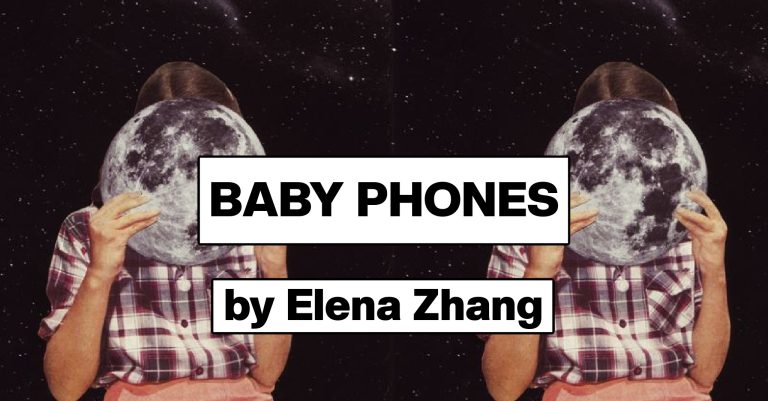
Micros
BABY PHONES by Elena Zhang
The babies are all born with phones in their hands. It hadn’t always been this way, but the babies needed a way to call poison control at their own leisure. At night, we hear the babies babble into their phones as we weep into our empty hands, while the soothing tones of the poison control operator tell them how to save themselves.
September 4, 2025
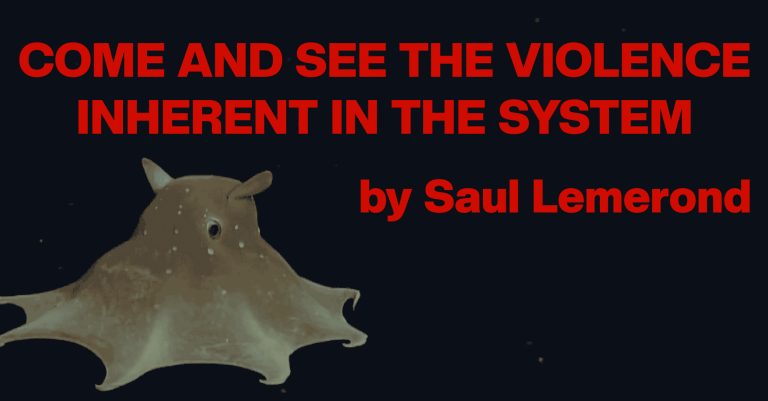
Fiction
COME AND SEE THE VIOLENCE INHERENT IN THE SYSTEM by Saul Lemerond
It’s another hot day, and the tide is rising. The son shoulders his father’s rifle and walks back toward the beach house thinking the reason he’s shot the hole in the tank is because his dad refused to buy him a half million follows.“Please like, comment, and subscribe.” He says, holding his phone at eye level and trying to steady his hand because he is still shaking with generational anger he will probably never understand. Water spills out onto the ground as the cat patiently watches the flapjack octopus scurry to the opposite side of its tank. Time is running out. The big cat hopes to eat soon. There is a large hole in the glass that the son put there, and soon this flapjack octopus will be sucked out with the last of the water onto the beach where the cat is waiting. “I can’t wait until the tank drains,” the really big cat says. “Because I’m going to eat you.”“I don’t know why you want to eat me so bad,’ says the flapjack, who is a gentle creature. “You know, I’ve never ever given you a reason to dislike me. I don’t really have anything against cats. It’s the rich man that bothers me, and I think he should bother you too.” “I imagine you are tasty,” the cat says. “The notion preoccupies me. Anyway, don’t blame me. This isn’t my fault. It’s not anyone’s fault. Blame Capitalism.” Neither of these animals actually say these things. Not strictly speaking. Animals cannot talk. At least not in any way we can understand. What the cat actually says is this:Meow. What it means, and what the flapjack octopus knows it to mean, is this: Blame Capitalism. Because they’re in Miami and because Miami is in Florida and because Florida is in the United States of America, Capitalism is the system on which the cat places most blame. What the cat thinks, and would say if it could, is that their owner, a multi-billionaire, is the reason for a great many conditions directly relevant to their present moment. The flapjack octopus would not deny this, though it does find it a tad ironic. It is a fact that the very big cat, the hole in the tank, and the boy with the rifle have all come to their present circumstances because of this very rich man. This man, a man who heads a notably successful private equity firm, likes guns and cats and rare octopi and has a son. If it were not for him, all of their material circumstances would be very, very different. Incidentally, he is very busy, this rich man, and ignores them all unless it’s convenient for him, which is most of the time.At any rate, there are octopi in large tanks all over the premise of this beachside property. Cats as well. Big. Well fed. Cats. And oh boy, do they want to eat the octopi. Every single one of them, especially this one. Meow. Luckly for this cat, the others haven’t yet come to investigate. That the cats had, up to this point, never been given the opportunity to eat any of the owner’s exotic octopi is a great source of consternation. One that leads them to understand they are living tragic lives, surrounded by what must both be delicious and lovely rubbery meat they can never chew because, among other things, they don’t have the resources. Meow.Capitalism. It was the only reason for all the octopi to be in and around this rich man’s house where the cats could see but not eat them instead of in the ocean where they belonged. This is doubly true for the flapjack octopus, which is exceedingly rare and unattainable to anyone who is not super rich. It’s also the reason for the hole in its pressurized tank, which was put there by the son of the rich man. “How about that, Dad?! How impressive is your big tank now?!” He had shouted while uploading the video of him shooting the tank to his socials. The flap jack octopus, who we might assume is trying to calculate its chances of survival, is running out of time, and the cat has a point as to why this is the case. “Damn this rich man and his son and his cat! God, I don’t want to die.” the flapjack octopus laments. “This is all very frightening. Beyond all that, this cat refuses to take responsibility for any of its actions, the state of its life, or recognize its own culpability in a much larger, very flawed system!” This last part being a common criticism of those who level systemic critique toward their specific and individually lousy lots in life. The flapjack didn’t say this last part. If you wanted to get overly technical, it didn’t say any of the parts, not precisely.What the flapjack octopus actually says is this: Bubble. Bubble.But it says it emphatically so, and as you might imagine, the cat is unmoved. To be fair, the octopus is conflicted as, as much as it’d like to, it can’t really see a clear path beyond our current systems of capital. Not that there couldn’t be one, it’s just that it can’t imagine what that would look like. “I am but a simple creature,” admitted the flapjack octopus on many an occasion, “so, it could be that in this case my pessimism is the result of my limited imagination.”Despite the self-deprecation, it is important we do not underestimate the complexity of the octopus, who it could be said, much like America’s Bard, contains multitudes. The flapjack does not want to die. To be eaten. But even more than this, it doesn’t want to be alone anymore. To be possessed by some rich man. It does have hope for freedom. For too long it’s been like a fish out of water, only instead of a fish, it is an octopus, and instead of being out of water, it is in a tank, separated from any kind of good company, or anything familiar to its species. It has not just been lonely, but existentially lonely. What’s worse than this is that the tank is in clear view of the ocean, so that the octopus, for as long as it’s been here, can see its true home. It can see the surf rolling up, over and over again, inviting him back to the place it knows it belongs, with what we as human beings might think of as equivalents of friends and family.What the cat doesn’t understand is the octopus has actually been waiting for this opportunity because it could be a chance to escape. The boy doesn’t understand this either, though this shouldn’t be a surprise to any of us because there are so many things the boy does not understand.Another thing he doesn’t understand is how, due to increased levels of CO₂ in the atmosphere, the sea level has been raising. For the octopus, this is a very important because if the pressure of the water leaving the tank is strong enough, and the tide is high enough, and the sea level has risen enough, then it has a chance at that thing it’s been waiting for. Freedom. But not just freedom. A return to the world it belongs. This would make the flapjack octopus very happy. Happier than it’s been in a long time, and the flapjack octopus deserves to be happy because it is a gentle creature. Bubble. Bubble.Is this octopus capable of the complicated calculations it needs to solve concerning its chances of survival or not? Probably it’s capable of some math. Most creatures are, even the son of the rich man. Speaking of, he is still walking toward the beach house, checking the engagement on his video. People are watching. They are liking, commenting, and subscribing, which is good because that is what he’s asked them to do. If asked, the son would’ve been able unable to say why he got so mad he shot the hole in the tank other that it felt like the right thing to do after his father refused to buy him a half a million bots to increase his subscriber numbers. And that he thought the video would make good content and generate no small number of followers, which in his mind was only fair since his father had denied him so many. The real reason? He is acting out because he idolizes his father more than anything in the world and never gets to see him because his dad is always too busy figuring out ways to increase his wealth, which communicates to his son, either subtly or unsubtly, that his father loves money more than he loves him. The fact that this was true for all major movers of commerce and industry does nothing to make the son feel more loved. The fact the father is just repeating the behaviors of his father before him doesn’t make the son feel more loved either. Ultimately, what the son wants is for his father to smile at him the way he smiles at his exotic flapjack octopus. To care about him the same way he cares about his money. In the absence of this, the son has learned to seek validation through the praise of people he’s never met by making social media content in hopes of becoming a major influencer. In short, the cat is right. Capitalism is to blame.Meow.And what of the flapjack’s chances of survival? Let’s look at the variables. The number of gallons in the tank. The tide. The position of the sun and moon and their gravitational pull on the ocean.The current. The speed at which this octopus must swim to get to a livable depth. And most of all, the release of CO₂, the warming of the earth, the melting of ice, and the rising sea levels. The conclusion? We cannot know. This story encapsulates only a brief moment in time. But one might imagine the flapjack’s conclusion is this: if the ocean level has come up just enough that when it gets sucked out of the tank, it rockets directly into the choppy surf and out to sea. Then, there is some likelihood that the flapjack octopus can safely get to the bottom of the Atlantic where it can spend its time hanging out with its friends and family waiting and watching the ocean levels rise and rise until everything on the surface, including the rich man, the son, and the cat, eventually drown. It's a very satisfying thought for the octopi. Mostly because the only rich thing left on the surface then would be the irony. Bubble. Bubble.
September 3, 2025
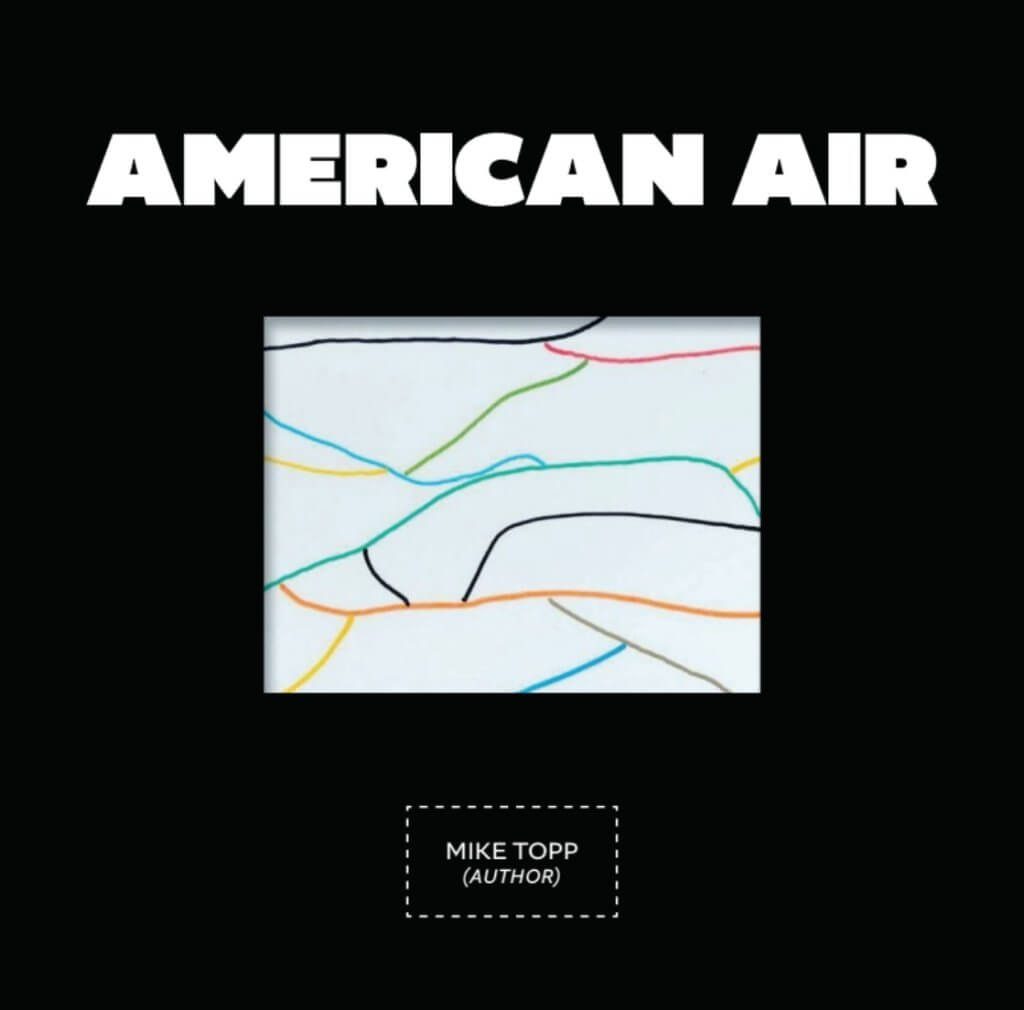
by Mike Topp
$25 | Perfect bound | 72 pages
Paperback | Die-cut matte cover | 7×7″
Mike Topp’s poems defy categorization. That’s why they are beloved by seamstresses, pathologists, blackmailers and art collectors.
–Sparrow

